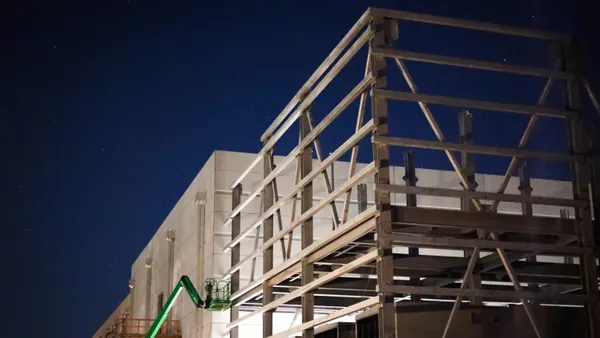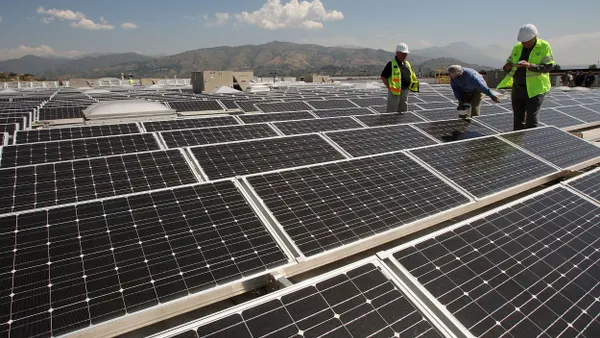Dive Brief:
- The North Carolina Department of Environmental Quality (DEQ) on Tuesday denied a key water permit for Mountain Valley Pipeline's (MVP) Southgate extension, a project that would extend the "Mainline" construction into Virginia and North Carolina.
- The DEQ cast doubt on the completion of the Mainline portion of MVP, refusing to approve a water permit and risk clean water and environmental impacts for the approximately 75-mile extension. The MVP Mainline 303-mile project is under a Stop Work order from federal regulators, who said the Southgate extension could only proceed with construction when the Mainline project had all of its federal permits.
- MVP can appeal the decision with the N.C. Office for Administrative Hearings or wait until the Mainline portion that goes into southern Virginia is complete before filing again for the Southgate extension. "The MVP Southgate team is currently evaluating its options but continues to target bringing this important project into service in 2021 to meet public demand for natural gas in southern Virginia and central North Carolina," Shawn Day, MVP Southgate spokesperson, said.
Dive Insight:
Pipeline opponents are interpreting the permit denial, which comes a month after the cancellation of the Atlantic Coast Pipeline (ACP), as proof that state regulators agree there is no need for increased natural gas in the region.
"The data has shown since ACP and MVP were asked... that neither of those pipelines have ever been needed" in North Carolina, said Joan Walker, senior campaign representative for Sierra Club's Beyond Dirty Fuels Campaign.
The Federal Energy Regulatory Commission and the North Carolina Utilities Commission recognized the need for the extension, according to Day. MVP is a joint venture between developer EQM Midstream and the subsidiaries of several utilities including NextEra Energy and Consolidated Edison.
DEQ's independent analysis called into question the need for the project in letters to FERC in 2018, noting a 100% increase in natural gas capacity in the state if ACP and MVP Southgate went into operation. ACP would add 100,000 dekatherms per day of capacity, while MVP Southgate would add about 300,000 dekatherms per day.
The pipeline owners for the respective projects argued that regional demand was increasing, but opponents remained skeptical.
"FERC doesn't require any analysis of need in the region ... and that's a huge loophole," Walker said. According to her, developers of pipelines can establish regional demand through their own subsidiaries.
In 2017, Oil Change International, Sierra Club and Public Citizen published a report confirming that 89% of the total ACP capacity had been reserved by affiliates of the pipeline's holding companies: Duke Energy, Dominion Energy and Southern Company, which later sold its 5% stake in the project. The report does not account for the Southgate extension but notes that 100% of MVP Mainline's capacity was reserved by companies affiliated with the pipeline's five owners.
Work has stopped on the MVP Mainline project, which must receive its Biological Opinion from U.S. Fish and Wildlife Service, along with permits from the Bureau of Land Management and the National Forest Service. Federal regulators issued a Certificate of Public Convenience and Necessity for the Southgate project in June, noting it could be built with limited adverse impacts but work could not start until activity on the Mainline project resumes.
Total project work is 92% complete, according to MVP. In June, MVP announced 80% of the pipeline work is complete, with 264 miles of pipe out of the 303-mile route welded and in-place.
Critics maintain that the work is far from complete. The Allegheny-Blue Ridge Alliance compiled data from MVP's filings at the end of June, published in a chart by the Virginia Mercury, to show that of the 303-mile route, 51% of the pipeline spread is finished. While about 260 miles of pipeline may be trenched, more has to be backfilled and finalized.
"What we're hearing from folks on the ground is that the number is much lower than that," closer to 60% complete, said Ridge Graham, N.C. field coordinator for Appalachian Voices. "DEQ didn't want to permit this destructive Southgate extension when there might not be a hookup."
The ACP project, owned by Duke and Dominion Energy, faced similar issues with the permitting and technical logistics of crossing the national trail. The project earned a win at the Supreme Court level in trying to attain a permit to cross underneath the Appalachian Trail, before the entire project was scuttled due to legal hurdles.
"Absent the ACP, we will evaluate multiple options to ensure the needs of North Carolina, especially in the eastern part of the state, are met in the near and long term," Duke spokesperson Tammie McGee said in an email. "Options could include additional infrastructure to strengthen eastern NC, and natural gas storage and compression investments" on the Piedmont Natural Gas system, which Duke owns.
Duke did not address the potential need for the MVP Southgate extension.
CORRECTION: A previous version of this brief attributed a link to the Allegheny-Blue Ridge Alliance. The chart was originally published in the Virginia Mercury.














